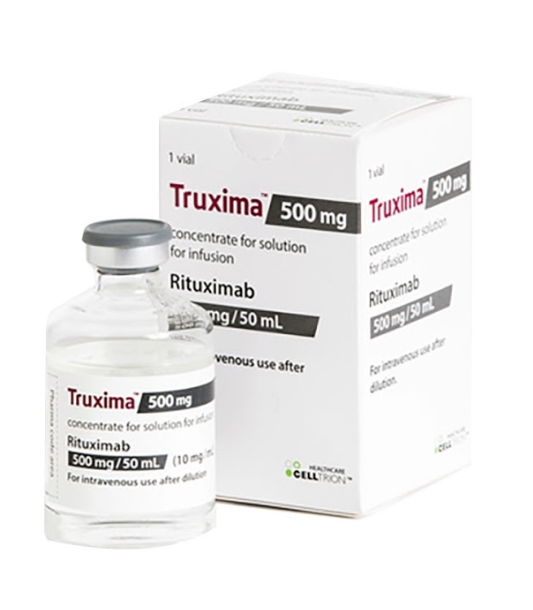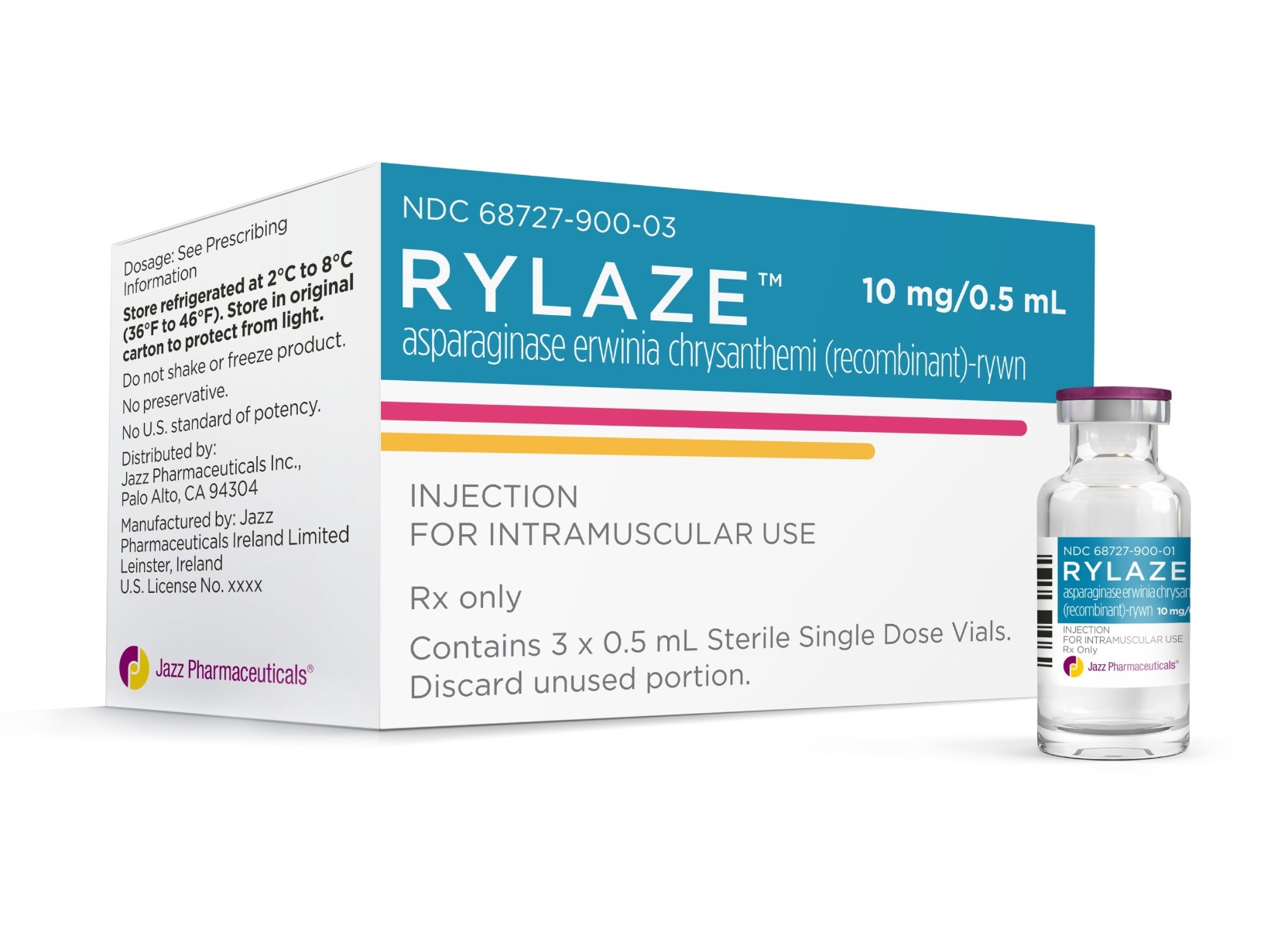Truxima (rituximab) vs Rylaze (asparaginase erwinia chrysanthemi (recombinant)-rywn)
Truxima (rituximab) vs Rylaze (asparaginase erwinia chrysanthemi (recombinant)-rywn)
Truxima (rituximab) is a monoclonal antibody used primarily to treat certain types of blood cancers, such as non-Hodgkin's lymphoma and chronic lymphocytic leukemia, as well as autoimmune diseases like rheumatoid arthritis. Rylaze (asparaginase erwinia chrysanthemi (recombinant)-rywn) is an asparagine-specific enzyme indicated as a component of a multi-agent chemotherapeutic regimen for the treatment of acute lymphoblastic leukemia (ALL) in patients who have developed hypersensitivity to E. coli-derived asparaginase. The choice between Truxima and Rylaze would depend on the specific type and characteristics of the patient's disease, as they are used for different conditions and have distinct mechanisms of action.
Difference between Truxima and Rylaze
| Metric | Truxima (rituximab) | Rylaze (asparaginase erwinia chrysanthemi (recombinant)-rywn) |
|---|---|---|
| Generic name | Rituximab | Asparaginase erwinia chrysanthemi (recombinant)-rywn |
| Indications | Non-Hodgkin's lymphoma, chronic lymphocytic leukemia, rheumatoid arthritis, granulomatosis with polyangiitis, microscopic polyangiitis | Acute lymphoblastic leukemia (ALL) as a component of a multi-agent chemotherapeutic regimen |
| Mechanism of action | Targets CD20 antigen on B cells, leading to their destruction | Hydrolyzes L-asparagine to aspartic acid and ammonia, depriving leukemia cells of the amino acid necessary for protein synthesis and survival |
| Brand names | Truxima, Rituxan, MabThera | Rylaze |
| Administrative route | Intravenous infusion | Intramuscular injection |
| Side effects | Infusion reactions, infections, cytopenias, cardiac events, renal toxicity | Hyperglycemia, pancreatitis, thrombosis, hemorrhage, hepatotoxicity, hypersensitivity reactions |
| Contraindications | Known hypersensitivity to rituximab or any of its components | History of serious hypersensitivity reactions to asparaginase erwinia chrysanthemi, or any of its components |
| Drug class | Monoclonal antibody | Enzyme replacement |
| Manufacturer | Celltrion Healthcare, Teva Pharmaceuticals, Genentech (a member of the Roche Group) | Jazz Pharmaceuticals |
Efficacy
Truxima (Rituximab) Efficacy in Lymphoma
Truxima, a biosimilar to the original rituximab product, is a monoclonal antibody that targets the CD20 antigen on the surface of pre-B and mature B lymphocytes. In the context of lymphoma, particularly non-Hodgkin's lymphoma (NHL), Truxima has demonstrated significant efficacy. It works by inducing apoptosis and making B cells more susceptible to the cytotoxic effects of chemotherapy. Clinical trials have shown that when combined with chemotherapy, Truxima improves overall survival and response rates in patients with different subtypes of NHL, including follicular lymphoma and diffuse large B-cell lymphoma. Its efficacy is comparable to that of the reference product, rituximab, which has been a cornerstone in the treatment of B-cell lymphomas for years.
For chronic lymphocytic leukemia (CLL), another type of lymphoma, Truxima has also been shown to be effective, particularly when used in combination with chemotherapy. Studies have reported improved outcomes, including longer progression-free survival and overall survival compared to chemotherapy alone. Truxima's role in maintenance therapy, where it is administered to prolong remission after the initial treatment, has also been explored with promising results in certain types of lymphoma.
Rylaze (Asparaginase Erwinia Chrysanthemi (Recombinant)-rywn) Efficacy in Lymphoma
Rylaze, also known as recombinant Erwinia asparaginase, is an enzyme used in the treatment of acute lymphoblastic leukemia (ALL). While it is not directly indicated for the treatment of lymphoma, asparaginase enzymes, in general, can be part of the therapeutic regimen for certain lymphomas, such as some subtypes of NHL that exhibit lymphoblastic features. Rylaze functions by depleting the amino acid asparagine, which is essential for the growth of lymphoblasts, thereby inhibiting tumor growth. Its efficacy is typically evaluated in the context of ALL, where it is used in patients who have developed hypersensitivity to E. coli-derived asparaginase.
However, the use of asparaginase, including Rylaze, for lymphoma outside of ALL is less common and would be considered off-label. The efficacy of Rylaze in lymphoma specifically has not been extensively studied or documented in clinical trials, and therefore its use would be based on the clinical judgment of the treating physician, taking into account the individual patient's condition and the biological behavior of the lymphoma. As such, more research would be needed to establish the efficacy of Rylaze in the treatment of lymphoma.
Regulatory Agency Approvals
Truxima
-
European Medical Agency (EMA), European Union

-
Food and Drug Administration (FDA), USA

-
Health Canada

-
Therapeutic Goods Administration (TGA), Australia

-
Medsafe (NZ)

Rylaze
-
Food and Drug Administration (FDA), USA

Access Truxima or Rylaze today
If Truxima or Rylaze are not approved or available in your country (e.g. due to supply issues), you can access them via Everyone.org.
How it works

Make an enquiry
Choose the medicine you want to buy, answer a couple of questions, and upload your prescription to speed things up. We’ll get back to you within 24 hours.


Make an enquiry
Choose the medicine you want to buy, answer a couple of questions, and upload your prescription to speed things up. We’ll get back to you within 24 hours.


Breeze through the paperwork
We'll guide you through the required documents for importing unapproved medicine, ensuring you have all the necessary information.


Get a personalized quote
We’ll prepare a quote for you, including medicine costs and any shipping, administrative, or import fees that may apply.


Receive your medicine
Accept the quote and we’ll handle the rest - sourcing and safely delivering your medicine.

Some text on this page has been automatically generated. Speak to your physician before you start a new treatment or medication.
Let's talk
If you have any questions, call us or send us a message through WhatsApp or email:
Contact us




